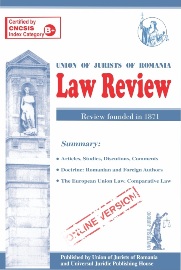Quality of public expenditure and transdisciplinarity: Law, economics, psychology, politics and public management
Quality of public expenditure and transdisciplinarity: Law, economics, psychology, politics and public management
Author(s): Leonardo da Silva Guimarães Martins da CostaSubject(s): Law, Constitution, Jurisprudence, Business Economy / Management, Civil Law, Public Administration, Accounting - Business Administration
Published by: Universul Juridic
Keywords: Quality; public expenditure; transdisciplinarity;
Summary/Abstract: This paper is about transdisciplinarity applied to quality of public expenditure. Transdisciplinary is a paradigm based on the integration and balance of opposite points of view (dualities). "Quality" in business management is an old comprehensive subject. In public administration „quality” should be used in a broader sense. In Brazil, for example, managers and controllers could have more dialogue. Dialectics and harmonization of contradictions are the key words. The main objective of this paper is to confront transdisciplinarity and quality of public expenditure to foresee solutions for quality improvement. The methodology adopted was based on Jungian psychology and on the MBTI System, also in the findings of a research of 2009 made in Italy regarding active and passive waste of public expenditure. In this connection, a scientifically oriented mental and technobureaucrat model leaves managers voiceless, insecure to make decisions, defensive, with no proactivity. This study highlights the implications for this question in the quality of public expenditure. On this purpose, four schematic models are presented: 1) Duality and four elements as troubleshooting requirements – sense, reasonableness, feasibility and rationality;2) Scheme for Nicolescu's Third Included with a practical example; 3) Disciplinarity, interdisciplinarity and transdisciplinarity in public administration – basically the interaction of Law, Economics, Psychology and Politics; and 4) Quality of expenditure as function of control level – research in Italy shows that only 17% of expenditure waste is due to corruption, most of it (83%) refers to mismanagement. Furthermore, our 2021 research mentioned in this paper corroborates that quality of expenditure is connected to balance of opposites, as transdisciplinarity itself. Finally, The first 3 models promote discussions for transformation of culture in international public administration, from a rational and scientific bias to a transdisciplinary vision. The findings and the conclusion of this study are connected to Model 1 to 3, useful not only for quality control, but also to promote a paradigm shift in international public administration, in view of the necessity of culture transformation, from the point of view of all actors involved (managers, controllers, politicians and civil society in general). As a cultural conditioning, those actors tend to be very focused on rationality and reductionism of hard skills. The idea is also to promote discussions for transformation of culture and behavior in international public administration, from a rational e scientific bias to a transdisciplinary vision. Hopefully these transdisciplinary concepts and applications may be useful for many countries.
Journal: Law Review
- Issue Year: 2022
- Issue No: 02
- Page Range: 3-24
- Page Count: 22
- Language: English
- Content File-PDF

